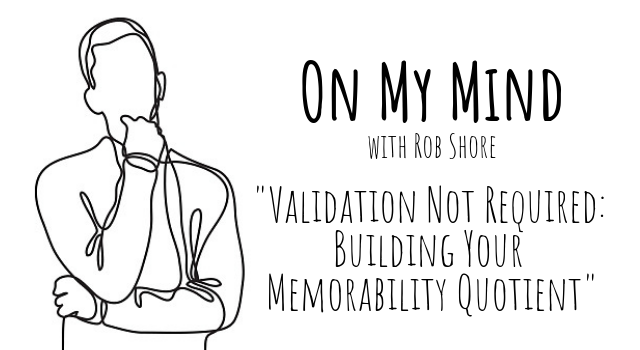Thoughts from Coach Rob Shore about the art, science and lifestyle of wholesaling, for wholesalers and their leaders.
This episode: Validation Not Required: Building Your Memorability Quotient®
How I Built This with Guy Raz: Men’s Wearhouse: George Zimmer
What’s on your mind? Email me at rob[at]wholesalermasterminds.com
Subscribe at Apple Podcasts or Subscribe via Stitcher or find us on Spotify by searching The New Wholesaler Masterminds Radio Show in your app or wherever you get your favorite podcasts!
On your smart speaker say, “Play The NEW Wholesaler Masterminds Radio Show podcast”.
Transcription:
A couple things have been coming at me over the past few days, and they’re really similar. I thought there was a message in there for me, and maybe there’s a message in there for you.
It’s a whole notion of permission versus validation. Permission, finding out that what you want to embark on is legally permissible, that it won’t get you in hot water with compliance, that allows you to maintain your integrity, that it upholds the standards of the firm. Your firm, your partner firm.
But the difference is permission versus validation, because sometimes we seek permission to do something, but then we go off to validate it, and we run into folks that tell us it can’t be done. We run into naysayers. We run into folks who don’t wish to take the same kind of leap and then distract us, deter us from taking the same kind of leap.
Let me give you two examples. These are the two things that came at me recently. One is George Zimmer. I don’t know if you’re familiar with George Zimmer. George Zimmer was Men’s Warehouse when he says, “We’ll make you look good, I guarantee it.” Men’s Warehouse where he is no longer with Men’s Warehouse, he was ousted when he was Chairman of the Board and CEO. But I listened to a podcast, How I Built This, if you want to go see it, How I Built This.
He was talking about how he started Men’s Warehouse, and all along the way he made moves that others may have thought crazy. He opened his first 6,000 square foot warehouse in Houston with very little money, very little inventory, and very quickly thereafter opened three more warehouses, and people told him he was nuts.
But he knew that he needed to pick up the scale of the marketing dollars he was spending and spread it across a broader geographic area. Hence he opened these additional stores. He went to, the suit maker at the time, Nino Cerruti. Nino Cerruti, a mid-level suit manufacturer who was selling at Macy’s, and he said to them, “Take off your label, I’ll put in my label. Sell me those suits at 20% less than you sell them to Macy’s, and nobody has to be any the wiser.”
Everybody he floated the idea to thought he was crazy, and in fact, Nino Cerruti did just that. And he was able to undercut the very same suit labeled differently, which was, I believe it was $399 inside of Macy’s, he sold it for $299.
He was asked by the interviewer what gave him, if you will, the audacity to think that he could do that, and he referenced back his mother. His mother, who essentially said, “You can do anything.” It was a very motherly thing to say, and he took it to heart, and he believed that throughout his career.
So then of course, he left Men’s Warehouse … was ousted out of Men’s Warehouse, and he’s now opened Generation Tux, online tux rental. George Zimmer.
And then another one came at me, within a day. That’s why I thought it was important to get this to you, because it was on my mind. Tor Hagen. I had never heard of this man. This man is a multi-billionaire. Tor Hagen is the CEO of Viking Cruise lines, and he had worked his way up in the cruise industry, and then he had an a-ha moment that he wanted to build ships that had no kids on them. That had no climbing walls, no bowling alleys, no formal nights.
He wanted to build a cruise line that was squarely positioned at a more affluent sector of the marketplace, 50 plus in terms of age demographic, and he’s killing it. But everybody thought he was crazy. Everybody, when he worked at Holland America, thought he was crazy. They thought he shouldn’t do it, it was a bad bet. The ships weren’t big enough, there wasn’t enough to do, et cetera, et cetera, Tor Hagen.
He did it anyway, even though people told him he was crazy. He sought permission, which is to say he got all the right legal entities to make sure that he could open up a cruise line, and build effective and efficient ships that wouldn’t sink.
But the validation piece was not emotionally validated by others, he just decided to do it. And I can relate to this myself. I mean, if you don’t know the background of Wholesaler Masterminds, Wholesaler Masterminds was born right smack dab in the middle of the great meltdown back in 2009/2009. Right in that recession, that horrible, horrible recession which I always say was the best thing that ever happened to my business, because it forced me to get laser focused.
When I left corporate America, I left corporate America thinking, “I’m going to be a speaker. I’m going to be a speaker to all financial services.” And then the great recession hit, and I got crushed, and I said, “I got to get laser focused.” And I got laser focused on wholesaling, which is where I lived. Wholesaler Masterminds was born.
And then came a magazine. I didn’t go out and ask anybody what they thought of the magazine. I was afraid of what they would say. And the magazine only lasted a few years, but it was a platform for a whole lot of other things that we’ve done at Wholesaler Masterminds.
If I had asked people, “Should I do the magazine?” They would have said, “No.” And I know why they would have said no, but I didn’t go out to get validation for it. I had permission, but I didn’t get validation.
Or this podcast. If I had gone out into the marketplace, the general podcasting marketplace, and said to folks, “Do you think that a podcast might work in a really teeny, teeny, teeny, teeny, teeny niche industry, like financial services wholesaling?” I probably would have heard, “No, no. You can’t scale it. No, you can’t monetize it.” Well, they don’t know what my motivations are for the podcast, which is to speak to listeners like you. So how would they know what to say when I go out for their “validation”?
What’s the moral of the story? Why do I even come to you with any of this today? Because I want you, please, to be thinking about your efforts in wholesaling in a bit of a bold way. Meaning, you don’t have to seek validation for everything that you do. You do need permission, you need to make sure … You can’t go off and start creating your own marketing materials. You need permission for the marketing materials that you use, if you have a written piece of marketing materials. That’s the rules of our road.
But some of the stuff that you do you don’t need validation, and if other people think that what you are doing is a little off by one step, it’s a little unusual by one step, it’s not quite what the herd is doing, good. That’s what builds your MQ, that’s what builds your Memorability Quotient®. That’s what allows you to stand out from the retched, nauseating sea of wholesaling sameness.



 How to Reduce Friction in Advisor Appointments: Wholesaler Tech Talk with Dave Lubnik from YCharts
How to Reduce Friction in Advisor Appointments: Wholesaler Tech Talk with Dave Lubnik from YCharts The Wisdom of Our Elders is Not Always Right with Nadine Keller
The Wisdom of Our Elders is Not Always Right with Nadine Keller Great Wholesalers Dare To Be Bold with Kathleen Wood
Great Wholesalers Dare To Be Bold with Kathleen Wood The Impact of Change on Distribution and Wholesaling with Steven Miyao
The Impact of Change on Distribution and Wholesaling with Steven Miyao Five Ways to Become a More Conscious Capitalist with Kim Ann Curtin
Five Ways to Become a More Conscious Capitalist with Kim Ann Curtin